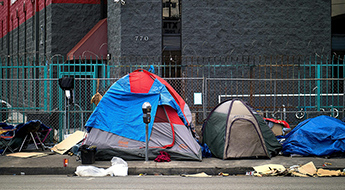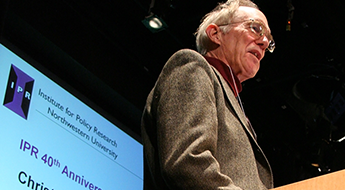The Value of Cross-Disciplinary Interactions
IPR psychologist Sylvia Perry discusses her recent fellowship and leading a diversity workshop
Get all our news
One of the amazing things about my time at CASBS was meeting scholars exploring the same broad questions as me but from different cultural and historical standpoints.”
Sylvia Perry
IPR psychologist

During the 2022–23 academic year, IPR psychologist Sylvia Perry took leave for a fellowship at the Center for Advanced Study in Behavioral Sciences (CASBS) at Stanford University. Each year, CASBS invites a group of scholars from various disciplines to work on their research while gaining perspectives from researchers outside their field. The prestigious fellowship is known for identifying distinguished scholars early in their careers and counts 26 Nobel Prize laureates, 24 Pulitzer Prize winners, and 51 MacArthur Fellows among its alumni.
Before Perry returned to Northwestern, she co-led CASBS’s inaugural Summer Institute on Diversity workshop for junior scholars, along with Mary Murphy of Indiana University and Jennifer Richeson of Yale University. Perry spoke to IPR about her fellowship and the workshop.
This interview has been edited for length and clarity.
What made CASBS distinct while you were there as a fellow?
One of the unique and beneficial features of the CASBS fellowship is its commitment to the study of the social and behavioral sciences through an interdisciplinary lens. For example, my cohort included international scholars from the fields of architecture, sociology, law, and computer science, among others. Despite our varied disciplines, it was nice that we all shared a common interest in understanding human behavior. In addition to facilitating an exchange of my ideas with other scholars, the fellowship also inspired my intellectual growth and novel approaches to my research. In fact, during orientation, the director joked that if we ended the fellowship with the same project ideas we started with, CASBS would have failed in achieving its goals.
One of the amazing things about my time at CASBS was meeting scholars exploring the same broad questions as me but from different cultural and historical standpoints. Several fellows and I were all studying the complex issues of race and social group labeling, but our focus areas ranged from the history of racism in the U.S. to India's caste system to South Africa's history of apartheid.
These interactions helped me think about how culture, context, and history shape how we see these socially constructed groups. Take, for example, Trevor Noah's bit on 'The Daily Show,' where he talks about how, in more recent history in South Africa, Black people were explicitly told they couldn't live in certain areas. At the same time, in the U.S., you might find that Black families are less likely to get home loans, but no one will directly say it’s because of their race. The difference is significant: In the U.S., acknowledging the role of race and racism in something like the racial homeownership gap serves a unique function, especially given our general denial that racism plays a role in these disparities.
In my work, I encourage White parents in the U.S. to avoid “colorblind” language when discussing race, especially in the context of inequality. But, being at CASBS allowed me to chat with other researchers and realize that the appropriateness of this approach can vary dramatically depending on whether you're in the U.S., India, or South Africa. The discussions I had there helped shape how I think about these issues and approach them in my research.
Did interacting with scholars from various locations and disciplines make you think differently about your own research?
Absolutely. Interacting with scholars from various disciplines and locations while at CASBS was a game-changer for me. As a social psychologist, my primary focus was experimental lab research utilizing quantitative statistical methods. Although my recent research has expanded to include qualitative methods and explores people’s real-world experiences outside the lab, I still felt I could push my work further. In line with this, interacting with other CASBS scholars expanded my perspectives in a number of impactful ways.
First, the fellowship exposed me to several methodologies that were new to me. For example, I met researchers doing ethnographic studies of social movements in France and those exploring the social implications of AI, such as how algorithms may shape human behavior.
Second, the diversity of approaches and topics I encountered made me pause and think more deeply about the broader relevance of my work. Why is what I'm doing meaningful, and who needs to hear about it? These questions have helped me think about new ways to disseminate my research findings, whether through community outreach, engaging with the popular press, or applying for grants that allow me to explore novel and perhaps even more “risky” research questions.
So, yes, this experience made me think differently about my own research. I've started to think more critically about the audiences I want to reach, the impact I want to have, and the methods I want to use. I also started thinking more critically about the methods we typically use in social psychology. For example, if we only ask questions in a lab using quantitative methods, we might miss out on nuances in what people think and feel in everyday life. It has also influenced my approach to funding, encouraging me to seek sources aligning with this broader vision for my work.
You co-led a diversity workshop this summer through CASBS. Can you tell me about the workshop and the purpose of it?
It’s called the CASBS Institute on Diversity. The Institute is a two-week program I co-direct with the founder, Dr. Mary Murphy, professor of psychology at Indiana University Bloomington, and Dr. Jennifer Richeson, IPR faculty adjunct and professor of psychology at Yale University. By fostering collaboration, providing support within an academic community, and offering professional development opportunities, the Institute aims to empower early career scholars from underrepresented backgrounds in higher education.
To achieve our goals, we invited leading scholars in the behavioral sciences, such as Jennifer Lee, Mesmin Destin, and Shelley Correll, to talk with the early career scholars. They shared insights about their work—giving research presentations, discussing how they settled on their specific research program, and engaging in informal discussions through fireside chats. They also covered important professional development topics, such as preparing for the tenure process, conducting interdisciplinary research, and writing for the public.
Another unique and essential aspect of the Institute is that it allowed the early career scholars to form a community and created a network of senior scholars they could call on for support. We hope to bring in future cohorts and provide opportunities for previous cohorts to interact with and form connections with newer cohorts so that we might build a broader community.
Sylvia Perry is an associate professor of psychology and an IPR fellow.
Published: September 13, 2023.


